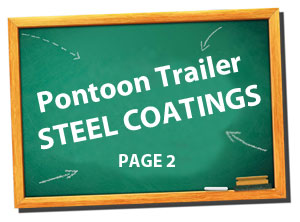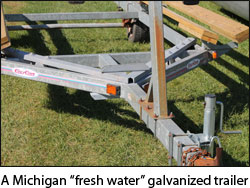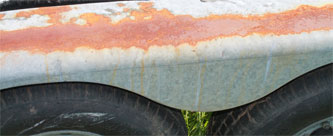 HOME | 1 | 2 | |
||||
Steel Coating: Painting, Powder-Coating, and Galvanizing cont... |
||||
 |
||||
| Gravel roads and winter road salt will destroy the finish on any trailer. Even the best finish won’t stand up to gravel stone chips or repeated use on roads with rock salt. | ||||
 |
||||
|
The finish on a trailer from
manufacturers who don’t
powder coat won’t last long.
The steel isn’t primed and the spray paint will be gone quickly. In the picture to the left the paint was scrapped off by just moving the winch stand. Some trailer manufacturers are galvanizing because they can’t invest in an expensive powder coat system. But in many cases galvanizing done on a limited budget isn’t as good as powder coating. |
||||
| A DISCLAIMER: Some of the trailers I’ve shown are from the best manufacturers, many of which have a reputation (often deservedly so) for good quality paint or powder coat finished. The point is to illustrate that if neglected, even the best steel coatings can deteriorate. | ||||
Galvanizing |
||||
| Some manufacturers promote galvanizing as the cure for rusting. If you’re going into salt water, galvanizing is a must. But there is a difference between cheap and quality galvanizing. Galvanizing on the major brands of pontoon trailers usually has deep penetration into the frame. The bare steel is often grit blasted before being galvanized. These trailers will stand up to years of repeated use in salt water. Galvanizing on trailers of small regional manufacturers can be as little as a few mils thick and the frames are usually not pre-treated. These manufacturers often galvanize pontoon trailers because they cannot afford a powder coat paint system. Rust can start within months at the friction points. Imperfections in the steel in thin finish galvanized trailers can rust quickly. I’m not a fan of galvanized trailers for fresh water boating. No matter how bright and shiny they are new, with age they end up a dull gray and often rusty. | ||||
 |
||||
 The
galvanizing process involves
dipping the trailer frame in
a solution, but trailer
manufacturers have no way of
knowing what the final
finish will look like.
Trailer frames dipped in new
(clean) solution come out
looking almost like chrome.
Frames dipped towards the
end of the galvanizing
solutions life come out dull
gray and may even have
sheets of galvanic slag on
the frame. The biggest
trailer manufacturers may
have some input on the
timing of dipping their
frames, but most
manufacturers don’t have
much clout with galvanizers.
You take what you get with a
galvanized trailer. It might
be bright and shiny or it
may be gray and dingy, but
after a couple of years The
galvanizing process involves
dipping the trailer frame in
a solution, but trailer
manufacturers have no way of
knowing what the final
finish will look like.
Trailer frames dipped in new
(clean) solution come out
looking almost like chrome.
Frames dipped towards the
end of the galvanizing
solutions life come out dull
gray and may even have
sheets of galvanic slag on
the frame. The biggest
trailer manufacturers may
have some input on the
timing of dipping their
frames, but most
manufacturers don’t have
much clout with galvanizers.
You take what you get with a
galvanized trailer. It might
be bright and shiny or it
may be gray and dingy, but
after a couple of yearsthey are all a dull gray. Most pontoon trailer manufacturers that are away from salt water don’t use galvanized hardware. These will rust and rust quickly in salt water. If you live near salt water it’s smart to buy a galvanized trailer from a trailer manufacturer close to salt water. |
||||
|
||||
| Aluminum Pontoon Trailers To my knowledge no one builds a good aluminum pontoon trailer. I was involved in a venture several years ago and we had bad results. That’s where I partially learned how different pontoon trailers were from ordinary boat trailers. The aluminum pontoon trailers literally vibrated apart. After we finally got it strong enough, the cost was prohibitive. YES, I know of Florida trailer builders making aluminum trailers for 40’ fiberglass boats, but as explained elsewhere they carry all the weight down the middle. Pontoon boat trailers are different. They carry the weight on 8’ centers. | ||||
| HOME | 1 | 2 | | ||||
| PONTOON TRAILERS 101 - FOR EVERYTHING YOU NEED TO KNOW ABOUT PONTOON BOAT TRAILERS |


